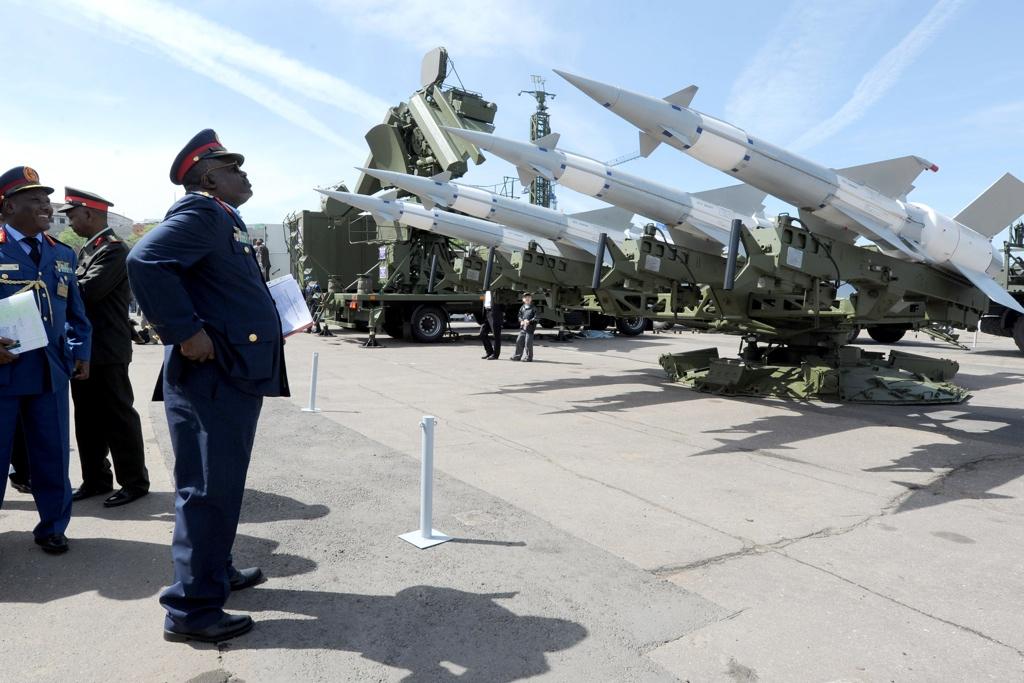US urged to provide air cover to South Sudan
South Sudanese officers look at an air defense rocket system displayed at the MILEX-2011 arms and military equipment exhibition in Minsk on May 24, 2011.
What can be done about the violence that Sudan President Omar al-Bashir's regime is inflicting on the border to South Sudan?
It's obvious to all that Bashir is up to the same dirty tricks that he played in Darfur — using militias, the army, the air force against ordinary subsistence farmers in order to claim control of their land. George Clooney's Satellite Sentinel Project is providing plenty of photographs that prooved beyond a shadow of a doubt the Khartoum government's buildup troops and tanks along the disputed Abyei area. And then the satellite photos showed the expected attacks on villages and settlements.
It has created a burgeoning refugee problem as thousands of families in the border area flee for their lives.
Yet no decisive response has come from the international community.
The activist group the Enough Project is urging the Obama administration to immediately begin preparations to provide air defense capabilities to the government of South Sudan when it becomes independent. Enough is also urging the Obama administration to ramp up an array of new financial sanctions aimed at the heart of the Bashir regime's military-industrial complex.
"The threat to civilians across Sudan in the weeks before the South becomes independent on July 9, 2011, is increasingly dire, and in the absence of international support for robust measures to protect civilians from conflict, it is imperative that the United States and its allies uphold the international responsibility to protect," said Enough in a statement just released.
“War has resumed in Sudan due to the offensive military operations launched by Khartoum,” said John Prendergast, co-founder of the Enough Project. “The current policy of offering carrots to the Sudan government has failed. President Obama should deploy immediate consequences for Khartoum’s escalation, and in the absence of international support to protect civilians, provide support to South Sudan to deter further air attacks.”
The Government of South Sudan has repeatedly asked the United States for air defense capabilities, and according to the Congressional Research Service, President George W. Bush approved this request in 2008. But it was not delivered. By fulfilling this request, the Obama administration can immediately impact the calculations of the actors in the North who have chosen to pursue military operations in violation of the Comprehensive Peace Agreement, as well as in Darfur, partly because of the military advantage afforded by their dominance of the airways, said Enough.
The United States has led diplomatic efforts in support of peace in Sudan and offered significant incentives for the Sudanese government if it chooses the path of peace, but as the situation in South Kordofan worsens, it is clear that these carrots on their own will prove insufficient, Enough said.
The United States should also make clear its commitment to continue supporting the defensive capabilities of South Sudan, on the condition that the government take steps to improve its military's human rights record and comply with its existing obligations under the Comprehensive Peace Agreement of 2005.
"Rigorous vetting of South Sudanese units for human rights concerns should be a precondition for this support," said John C. Bradshaw, Executive Director of Enough. "Air defense systems, such as medium-range surface-to-air missile systems, should be closely monitored to ensure they are used for protection of civilian populations, and should exclude man-portable systems that could be used against civilians or be diverted to non-state actors. As part of a wider package of security assistance, this equipment and training should provide leverage to improve the human rights record of the southern security forces. Further support should be carefully conditioned upon progress toward the professionalization of South Sudan’s security forces and respect for human rights."
The story you just read is accessible and free to all because thousands of listeners and readers contribute to our nonprofit newsroom. We go deep to bring you the human-centered international reporting that you know you can trust. To do this work and to do it well, we rely on the support of our listeners. If you appreciated our coverage this year, if there was a story that made you pause or a song that moved you, would you consider making a gift to sustain our work through 2024 and beyond?
